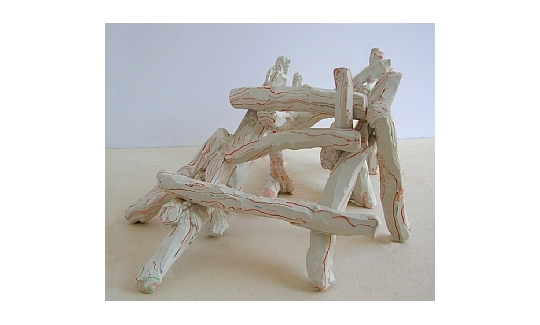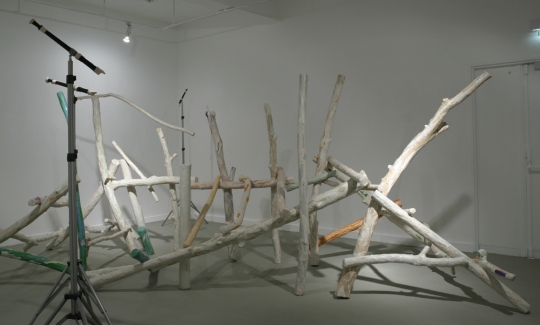MARSHIM
Efrat Klipshtien: Even Heroes Need a Hug
Saturday, 25.11.06
Friday, 11.05.07
More info:
04-6030800Curator: Yehudit Matzkel
Visitors to Yuval Stern-Cedolin's exhibition are invited to explore a maze-like space covered with paintings. Dominated by a powerful shade of red, this maze was designed to provoke a temporary sense of spatial disorientation. The invitation to enter it is predicated on a ludic principle and on cooperation between the artist and the visitor. The poetic apogee of this deception is revealed at the end of the maze in the from of a "prize," with which the viewer is rewarded: a refined depiction of a wolf's head that seems either to be etched into or to protrude out of the wall, this image provides the key for deciphering the name of the exhibition ("Flow" is the inversion
of "Wolf").
The trope of the maze, or labyrinth, has multiple historical and cultural allusions. In European history, there are numerous examples of meticulously designed, mysterious garden mazes created on the estates of Central European noblemen during the 16th and 17thcenturies. These mazes provided amusement for visitors, and were the site of illicit romantic encounters. In this context, the artist argues that "One needs to distinguish between the mythological labyrinth and a ludic maze. The labyrinth is more complex than the maze, and involves an element of imprisonment (as in the Greek myth of the Minotaur) - it is an illusion that does not reveal its deceptive nature." Indeed, the mythological labyrinth involves the danger of eternal imprisonment. The experience of the ludic maze, by contrast, is predicated upon a conscious agreement to enter it and upon the element of amusement. Stern-Cedolin's work may evoke childhood memories of visiting an amusement-park mirror maze. It may also recall themes from fairy tales such as Alice in Wonderland, Little Red Riding Hood and Peter and the Wolf, which involve a fear of getting lost and a sense of adventure, magic and mystery. Flow enjoins the visitor to undertake an enchanted journey, which may be likened to wandering through the human brain while succumbing to a liberating, meditative experience of clarity and inner peace.
Yuval Stern-Cedolin was born in Hadera (1976). He is a graduate of Hamidrasha, the School of Art at Beit Berl College (2000-2005). He studied classical sculpture at the College of Art in Cadiz, Spain (1997-1998). He also studied calligraphy and ink drawing in Beijing at the studio of Lu Shan. His solo exhibition "Lost Time" was shown at The Office, Tel Aviv (2006). He also participated in the group exhibition "Trademark Art" at Crip Productions, Tel Aviv (2006). He lives and works in Tel Aviv.


